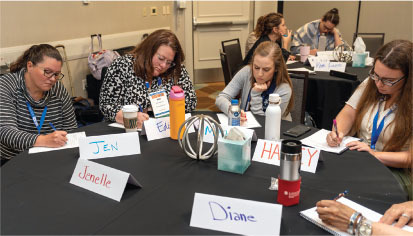September/October 2018
Leading Insight
Diversity and Inclusion Through Actions
It’s vital that engineering firms solidify their growth potential with a more dynamic and diverse talent pool and adopt a new outlook on what it means to exhibit leadership. Firm leaders may also want to pay closer attention to ensuring that their actions on diversity and inclusion are matching their rhetoric to effectively recruit and retain this type of workforce, advises a Deloitte report.
Research participants expressed that diversity and inclusion were attributed to their positive experiences in the workplace, and they want to make sure that top leadership is actively fostering more inclusive environments. They desire an organization that invites people to bring their true selves to work and rewards authenticity. About 55% of participants stated that inclusion is talked about more than acted on within their organization. The good news is that when acted upon, 75% reported that inclusive environments helped them discover new perspectives and grow as professionals. Nearly 70% said that a focus on diversity encourages creativity, and 55% linked increases in profitability to diversity.
Employees are looking for a few key traits from their current leadership. They believe effective leaders are communicative (71%), hardworking (68%), flexible (58%), confident (58%), and patient (53%).
Organization leaders, the report says, should focus on transparency, authenticity, and recognizing their own weaknesses. Employees also want their organizations to minimize barriers to career growth with leadership that doesn’t succumb to office politics, articulates a clear vision, and understands employees’ strengths.
The research offers the following six traits to improve inclusive leadership:
- Commitment—Treat everyone with fairness and respect, foster environments where team members can be themselves by modeling authenticity, and empower each other’s well-being.
- Courage—Engage in tough conversations when necessary. Identify opportunities to be more inclusive, take ownership, and engage others.
- Cognizance of bias—Be aware of unconscious biases so decisions can be made in a transparent, consistent, and informed manner.
- Curiosity—Listen attentively and value the viewpoints of others.
- Cultural Intelligence—Seek out opportunities to experience and learn about different cultures and be aware of other cultural contexts.
- Collaboration—Create teams that are diverse in thinking.


 Volunteering at NSPE is a great opportunity to grow your professional network and connect with other leaders in the field.
Volunteering at NSPE is a great opportunity to grow your professional network and connect with other leaders in the field. The National Society of Professional Engineers (NSPE) encourages you to explore the resources to cast your vote on election day:
The National Society of Professional Engineers (NSPE) encourages you to explore the resources to cast your vote on election day:




